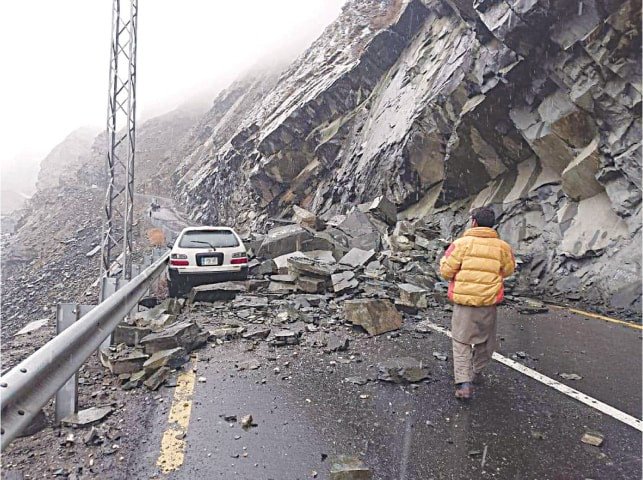by Roheena Ali Shah
As Gilgit-Baltistan mourns the loss of five more lives, the message is clear: enough is enough. The devastating landslide tragedy at Malupa, Rondu Valley of Skardu, which occurred on December 15, has sent shockwaves throughout the region. The incident sparked widespread outrage, with protests erupting on social media and a long march by political activists from Gilgit to Skardu demanding improved road infrastructure.
On that fateful day, a vehicle carrying five passengers was traveling from Skardu to Shingus when a massive mountain landslide engulfed it, sweeping the car away and leaving no chance of survival for its occupants.

The Malupa tragedy is a grim reminder of a disturbing cycle of catastrophic incidents plaguing the region. Poorly designed infrastructure, rampant corruption, and a glaring lack of attention to road safety have created a perfect storm of hazards.
Gilgit-Baltistan is among the world’s most climate-vulnerable regions, bearing the brunt of catastrophic weather events with alarming frequency. This year alone, the region was ravaged by torrential monsoon rains, unleashing destructive landslides and flash floods that swept through villages like Kushnat, Pakora, and Mominabad. The devastating aftermath included the heartbreaking loss of two young lives and the destruction of critical infrastructure, including a veterinary hospital and a school, leaving communities shattered and vulnerable.
The region’s infrastructure has also been severely impacted, with the Karakoram Highway repeatedly blocked by landslides triggered by heavy rainfall and snow.
The tunnels conundrum
This heart-wrenching tragedy has once again highlighted the perennial dangers lurking on the treacherous Jaglot-Skardu Road (JSR). Dubbed the “Gateway to Skardu,” this critical highway is a lifeline for the people of Gilgit-Baltistan and tourists alike, connecting Gilgit to Skardu and facilitating trade, tourism, and daily commutes. However, its condition has been a longstanding concern, with frequent landslides and rockfalls posing a significant threat to travelers exacting a devastating toll on human life and perpetuating a culture of risk.
The original design of the highway envisioned tunnels as a critical safety feature, intended to protect travelers from landslides in disaster-prone areas like Malupa. However, these plans were never realized due to budgetary constraints and bureaucratic red tape. Consequently, travellers remain exposed to the mercy of nature, with no respite from the relentless rockfalls and landslides that imperil the road.
For years, the people of Baltistan have been calling on the government to revisit the original designs of the Jaglot-Skardu Road, prioritize tunnel construction, and implement effective measures to mitigate landslide risks.
Only then can we hope to prevent future tragedies like the one at Malupa and restore faith in the promises made to the people of Baltistan.

Roheena Ali Shah is a development practitioner, a columnist and gender expert

The High Asia Herald is a member of High Asia Media Group — a window to High Asia and Central Asia
